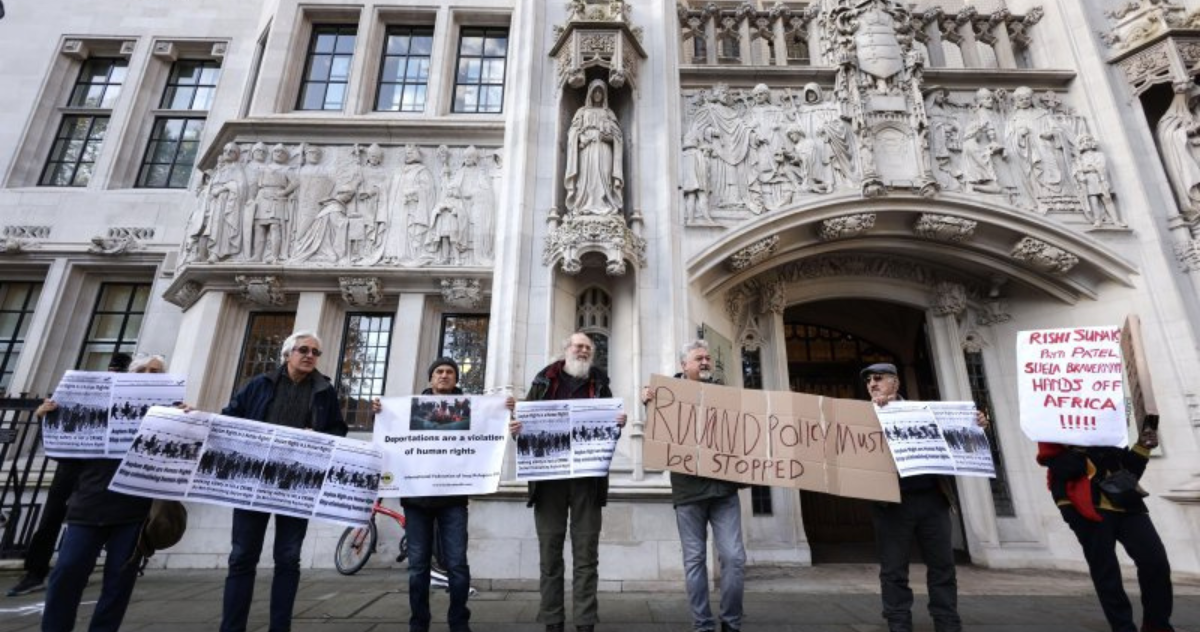London (Parliament Politics Maganize) – The UK government’s Rwanda asylum policy, aimed at addressing issues related to small boats, is in disarray following a ruling by the country’s highest court declaring it unlawful.
The Supreme Court has affirmed a previous Court of Appeal decision, stating that the policy exposes individuals sent to Rwanda to potential human rights violations. As a result, the current form of the policy cannot be put into effect.
Despite this setback, Rishi Sunak has indicated his determination to pursue the plan and has outlined measures he believes will rejuvenate it.
UK’s Rwanda Asylum Policy Deemed Unlawful by Supreme Court
Since its announcement by Boris Johnson in April 2022, the contentious proposal to transport asylum seekers to Rwanda and prohibit their return to the UK has faced legal challenges.
The government has invested £140 million in the initiative, but flights were halted in June of the previous year when the Court of Appeal deemed the approach unlawful due to a lack of human rights safeguards.
With the endorsement of the UK’s highest court, the prospects of implementing the policy without significant revisions have essentially come to an end.
However, during Prime Minister’s Questions, Mr. Sunak informed MPs that he is poised to conclude a formal treaty with Rwanda. He expressed his willingness to “revisit our domestic legal frameworks” in an effort to breathe new life into the plan.
Government Faces Revisions as Supreme Court Rejects Immigration Policy
Downing Street has announced that the treaty, set to be released in the “coming days,” aims to elevate the existing agreement between the UK and Rwanda, currently categorized as a “memorandum of understanding,” to a status that the government believes will provide a more robust legal foundation for the arrangement.
Ministers are compelled to reassess their prominent immigration policy following a Supreme Court case where 10 claimants argued that ministers had disregarded compelling evidence highlighting the unfair and arbitrary nature of Rwanda’s asylum system.
The legal challenge against the policy centers on the principle of “non-refoulement,” asserting that individuals seeking asylum should not be sent back to their home country if such a return poses a risk of harm—a principle entrenched in both UK and international human rights law.
In a unanimous ruling, the court’s five justices concurred with the Court of Appeal, emphasizing the lack of a thorough evaluation regarding the safety of returning asylum seekers to Rwanda.
While the judgment does not outright prohibit the deportation of migrants to another country, it significantly undermines the viability of the Rwanda scheme. The aftermath is marked by uncertainty, as it remains unclear which other nations would be willing to enter into a similar agreement with the UK.
Read More: The Rise of Triple Glazing in the UK: A Shift in Home Insulation Trends
Supreme Court Highlights Lack of Safety Assessment in Rwanda Asylum Policy
The Supreme Court justices expressed concerns, citing “substantial grounds” to believe that individuals deported to Rwanda might subsequently be transferred by the Rwandan government to places where their safety is compromised.
They acknowledged the Rwandan government’s initial commitment in “good faith,” but the evidence raised doubts about its “practical ability” in the short term to address deficiencies in its asylum system and to implement the necessary changes in procedure, understanding, and culture.
A spokesperson for the Rwandan government asserted that the legality of the policy is ultimately a decision for the UK’s judicial system. However, they contested the ruling that Rwanda is not considered a safe third country.
The ruling puts Mr. Sunak, whose government has prioritized addressing illegal immigration, in a position where he must find a way to salvage the policy.
Following the court’s decision, the prime minister issued a statement asserting that the government had been preparing for all possible outcomes and remains fully committed to preventing illegal immigration by sea.
He highlighted that the Supreme Court, in alignment with the Court of Appeal and the High Court, affirmed the lawfulness of the principle of sending illegal migrants to a safe third country for processing, reinforcing the government’s stance from the beginning.
The Supreme Court’s verdict adds to the political ramifications stemming from the dismissal of Suella Braverman on Monday, who, as home secretary, had been a staunch advocate of the Rwanda policy.
In a strongly worded letter published following her dismissal and a day before the court ruling, Suella Braverman criticized the prime minister, stating that he had not developed any credible Plan B in the event of the Supreme Court blocking the policy.


